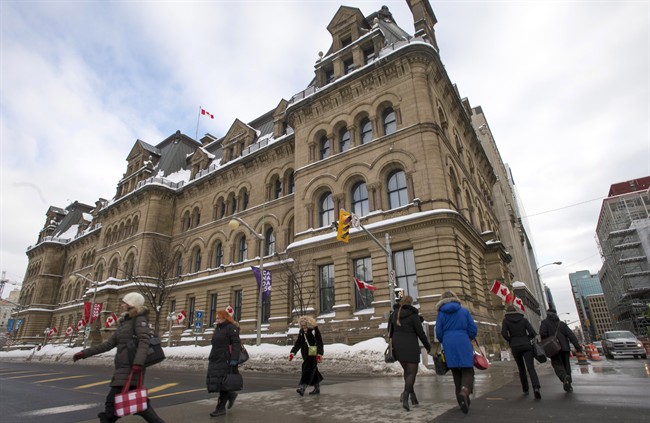There is plenty of evidence that the forces that delivered Donald Trump to the White House and are driving Britain out of the European Union are alive in Canada. Across Canada, there has been a protectionist/nationalist view bubbling at or near the surface for a while now. It may be unfortunate and these views are far from universally held, but anyone who believes otherwise or that the rise of the federal Liberals and the New Democrats in Alberta were anything but a rejection of the previous regimes are looking at the political landscape through red and orange coloured glasses.

Before we spend the next few decades re-establishing our values, I think we should look at what is really worrying Canadians. For the most part, they are concerned about the future – their retirement, their children’s lives, etc. They see large systemic problems on the horizon that range from climate change to the impact of new technologies on the labour market. They feel that they are being left behind.
Unfortunately, those who are most concerned feel that they have nowhere to turn, so they are either looking to return to a time when they were more comfortable and/or they are lashing out at anyone who holds different views or just looks different. What they do not see are governments that are capable and willing to tackle these concerns.
WATCH: Prime Minister Justin Trudeau finally met face-to-face with new U.S. President Donald Trump – and Trudeau walked away with many assurances the relationship between our two countries would remain strong. But as Vassy Kapelos reports, the victory wasn’t pretty.

Canadians have long since lost touch with their governments. Perceptions of trust, value, and efficacy of governments at all levels have been on the decline for decades. I don’t believe that the rise of populism or post-truth (or whatever the label du jour is) has been the result of a shift in values. Instead, I think it has been the result of a slow and steady withdrawal of governments from their relationships with citizens. In short, governments have stopped talking to Canadians in a meaningful manner. They no longer lead. They no longer tackle tough issues and engage in campaigns to explain their policies to citizens. Citizens have been left alone staring at an often confusing and bleak future.
- Most Canadians now want early election as Trudeau support drops again: poll
- NDP will vote to topple Trudeau and propose confidence vote, Singh says
- This Canadian is his school’s first medical student in a wheelchair. He’s thinking big
- Can Canada avoid Trump tariffs? Likely some, but not all: ex-envoy
Governing today is more fluid. Like running water, the policy direction of past governments has largely been dictated by the path of least resistance. When they do go against the flow of popular opinion their communications efforts are aimed at hiding the issue or confusing it with other facts and messages rather than explaining why there is a need to move in a different direction. The Trump administration and their “alternative facts” have no doubt taken this art form to new heights (or lows?), but every week for the past two decades government Ministers have routinely stood up in Question Period in the House of Commons to give non-answers to non-questions. This is the example we put forward to Canadians of what informed debate looks like.

Get daily National news
Governments have stopped trying to convince, educate and communicate with Canadians, and instead have focused on the quick and easy. Like a retailer looking to boost short-term sales with 50 per cent off, rather than create long-term value for their customers, governments have responded to and fed the short attention spans of their constituents and the media.
Sure there are exceptions. I think Mayor Nenshi and the City of Calgary are a good example of how to reach out and communicate in this new world, and I’m sure there are examples in other communities as well, but for the most part successive federal and provincial governments of all stripes have more often than not failed, or not even attempted to communicate the difficult and complicated in favour of the quick and easy tweet.
This isn’t all governments’ fault. The rise of social media, the decline of the traditional news media, and a general shift from quality to quantity of news have all been factors.
The other issue dragging down the government and its relationship with citizens is front-line service. One only needs to look at the convoluted mess that is your average utility bill, visit a government website, or dare to make a call to any government office for information, and you’ll understand why Canadians keep telling us that they view going to any level of government as their last resort. They see government as the place to go when they run out of options, rather than as a trusted partner. On something as important as our health, people have repeatedly told us “I have to be very, very sick before I look to the health system for help”. Same thing in business. If someone wants to start a business and create jobs, going to the government is far from their first choice for advice and support. Sure there are things like passports (one area where making the service an arms-length agency seems to have worked), licenses of all kinds, and taxes, where Canadians have no other options. Canadians rarely enter into these transactions with hope and optimism and rarely leave saying “I would like to do that again.”
So how do we make it better?
First, Canadians must demand more accountability and better service from our governments. There are only a handful of issues that Canadians consistently rank as the top issues they care about. Health, the economy and taxes. Governments should spend most of their efforts and resources on these areas, improving service and explaining in detail what they are doing, why they are doing it and how it will address future concerns. Then communicate it again and again and again. But it won’t be easy. There won’t be a lot of ribbon cutting and cheques to hand out in front of the local community groups, but it will show that governments are focused on the same issues as real people are.
WATCH: President Donald Trump defends his administration and attacks the media in a meandering press conference Thursday

Looking to the private sector isn’t the cure-all for governments, but they could take a lesson from large corporations that are working hard to create loyal customers. They explain how and why their products and services work for consumers. They show value by responding to their clients’ needs (not necessarily wants) and provide great customer service to keep people coming back. In a recent venturebeat.com article, Amazon’s Maria Renz, vice-president and technical adviser to the CEO, and Toni Reid, director of Amazon Alexa, write:
“We advise looking at your customer base, listening to them, and understanding their core needs and ways in which you can make their lives easier… don’t be afraid to invent on the customer’s behalf—customers don’t always know what to ask for.”
Deep, deep down I am an optimist. I think the pendulum can only swing so far before it comes back, and we all stop focusing on the short term. To paraphrase an aging British rocker, there will soon be a day when we look at governments with the view that we can’t always get what we want but if we choose the right governments we will get what we need.
This article was written by Mike Colledge, the President of Ipsos Public Affairs in Canada. Ipsos is the official polling partner of Global News.







Comments